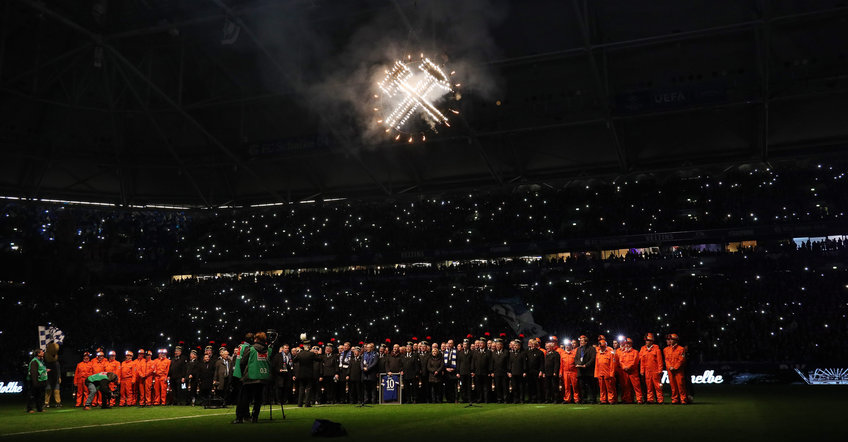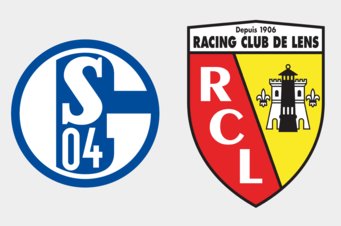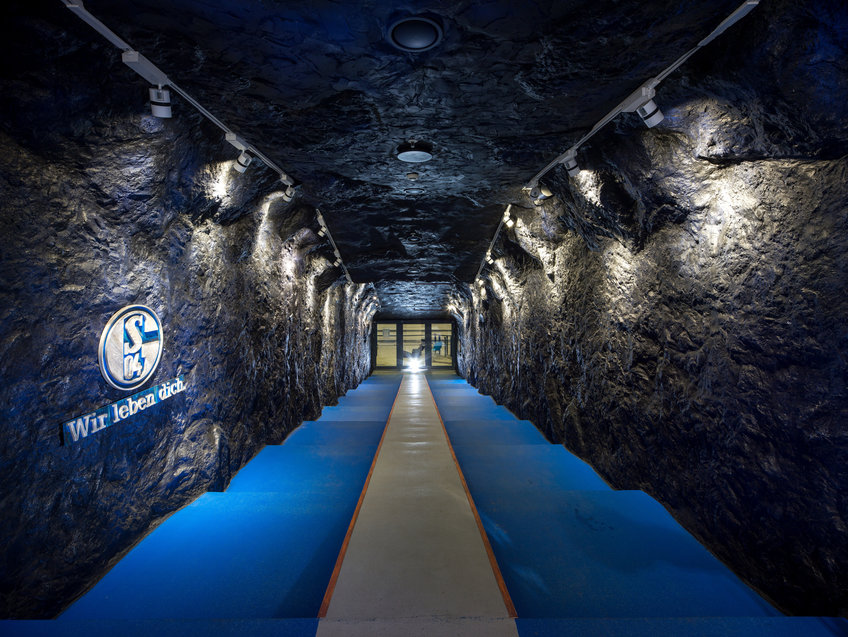Solidarity in the stadium
Football clubs in former coal mining areas play an important role in terms of social cohesion between the now unemployed
In large swathes of Germany’s industrial Ruhr Valley region, coal mining is a thing of the past as is true in other European coalfields. But people in the affected regions continue to be hard hit by the associated job losses, as jobs not only secured their livelihoods, but also created a sense of community. At the Max Planck Institute for Human Development Julia Wambach is looking into what replaced worker solidarity and has come across two committed football clubs: FC Schalke 04 and the French club RC Lens.

Text: Julia Wambach, Max Planck Institute for Human Development
In the industrialization era, coal mining and steel production served as an economic engine and a guarantee for secure jobs, but the coal and steel industry began to decline in the second half of the 20th century. Around two thirds of jobs in the coal mining and steel industries were lost in the Ruhr Valley between 1976 and 1998, a development that was reflected in other coal and steel regions. Researchers refer to this as “deindustrialization”.
The negative social consequences of this development have been discussed many times: Didier Eribon, for example, touches upon the atomization of the working class and the consequences of unemployment for families, social cohesion, and for the affected cities and regions in his bestseller Returning to Reims as did Edouard Louis in The End of Eddy, and Darren McGarvey in Poverty Safari.
My research project is focused on another specific question in this context: what actually happens to social cohesion, or – to put it more plainly: to solidarity – when the industry around which it has developed no longer exists? Of course, the idea that this sense of solidarity, this social cohesion existed in the pre-deindustrialization era involves a certain amount of idealization, but let’s just accept that for now.
I chose two places in Germany and France as case studies: Lens in northern France and Gelsenkirchen in the Ruhr Valley. Although the two towns are of different sizes – the population of Gelsenkirchen is nearly 260,000 whilst that of Lens is just slightly above 30,000 – both are located in the middle of former coal and steel regions and are emblematic of the post-industrial malaise in terms of their unemployment figures. The unemployment rate in Gelsenkirchen currently stands at 13.7 percent, which is significantly higher than twice the German average, whilst the figure for Lens is 11.5 per cent, some 50 per cent higher than in the rest of France. However, in Lens the mines were closed much earlier than in Gelsenkirchen, the last one was closed down in 1986, whereas the Ewald-Hugo colliery in Gelsenkirchen remained active until 2000.
Bad press
Since then, the two cities have often been viewed as decaying wastelands on the map of Europe and only make the headlines when there are negative things to report, such as the high proportion of votes for the extreme right-wing parties Front National and Alternative für Deutschland (AfD). In the 2021 Bundestag elections, for example, the AfD in Gelsenkirchen garnered 14 per cent of the fist votes, which is twice as many as in the rest of North Rhine-Westphalia. And in the run-off election for the French presidency this April, Marine Le Pen of the Front National gained 58 percent of the votes cast in Lens.
Negative stereotypes about the two cities abound: when an offshoot of the Paris Louvre opened in Lens in 2012, the director of the Louvre explained in an interview with the BBC that it was very important for the museum “to be in a place where you didn‘t have any culture before”. Gelsenkirchen’s reputation in Germany is similarly poor: the town was ranked last out of 401 in a study about the best place to live in Germany commissioned by the Second German Television channel (ZDF) in 2018. The study was criticized from many sides, and the Max Planck Institute for Human Development also included it in its "Unstatistics of the Month" section in April 2019. Gelsenkirchen residents reacted to the finding with self-irony, combining the ranking with the city's car registration number to create the hashtag #401GE, which they had printed on T-shirts and sweatshirts.
What this anecdote shows is that there must still be a certain degree of self-confidence and cohesion within the city. There is indeed even more evidence to support the idea that solidarity did not simply disappear during deindustrialization, but changed location. In both cases the focal point of solidarity shifted to the local football clubs: FC Schalke 04 and Racing Club de Lens. The sense of belonging and the practice of solidarity have been transferred from the work sphere to the world of sport. In other words, the footballers came to represent the miners and their tough everyday lives. As traditional forms of workplace-based solidarity became obsolete, the success of these football teams helped to re-establish a community and a sense of group belonging.
Close ties between mining and football

One of the reasons this has worked so well is that the football teams in Lens and Gelsenkirchen had enjoyed close ties to the coal industry even before its terminal decline. Both clubs were founded at about the same time, Schalke 04 in 1904 and RC Lens in 1906. The local mining concern Compagnie des Mines de Lens took over RC Lens in the late 1920s. Schalke 04 was founded by a group of young people from the Gelsenkirchen-Schalke district, a number of whom were serving as apprentices at the local Consolidation colliery.
The mining heritage is still evident in both teams’ coats of arms: that of RC Lens has included a miner's lamp since 1955, whilst a collier’s mallet has been included in Schalke’s crest since 1958. RC Lens’ colours, blood and gold (sang et or), represent black gold (i.e., coal) and the blood of the miners. The names of the Schalke 04 stadiums refer to the collieries: the "Glückauf Kampfbahn" includes the traditional greeting used by German miners (glückauf) and the "Auf" part of the "Auf Schalke" arena, which opened in 2001, also refers to the colliery. The players' tunnel in the new arena is modelled after a coal seam and the players are still called “Knappen”, just like the time-served colliers of old. Until it was bought by the city in the 1970s, the stadium in Lens, the Stade Bollaert, was owned by and situated on the premises of Compagnie des Mines.
In the heyday of coal, both clubs benefited from their links with the local collieries. The collieries were able to offer lucrative employment opportunities in the mines in an era when players were not yet able to earn a living by playing football and had to take paid work. Many of the well-known players had little experience underground or were merely the sons of miners but the image of the footballing colliers remained in the minds of the fans.
The fact that they had supported an underdog team due to its colliery era roots helped the fans to prepare themselves to face events that were out of their control such as deindustrialization. These teams came to be seen as the last bastion for those who had lost their jobs and continue to represent a sense of community. On their website, Schalke 04 explains: "In combination with the unique solidarity that emerges underground, where the miners trust each other with their lives, the nucleus of the royal blue power – the “let’s be having you then”, the “never let ‘em grind you down” attitude – is forged. No mines, no Kuzorra, no Szepan, no Tibulsky, no Urban": these were the Schalke 04 heroes and footballing colliers.
Solidarity through hard work

In the Ruhr dialect the word "malochen", which comes from Yiddish, means to do physically hard work. The ideal image is the footballer who works as hard on the pitch as the miner underground. Schalke 04 still calls itself the "Kumpel- und Malocher-Klub" (Collier and Hard Worker Club) and has chosen (also in comparison to other clubs) to keep the tradition alive and use it to create a sense of community with the fans.
In Lens they use a term that works in a similar way: "mouiller le maillot", which literally means "to wet the shirt", i.e., to sweat, and also creates a link between the hard-working miner and the footballer on the pitch. Deindustrialization and unemployment have not lessened the attraction of hard work and the pride in labouring for a good and common cause. The workers who had lost their jobs in the mines were still able to identify with the concept because they themselves had worked hard in the past. As Anoop Nayak, Professor of social and cultural geography at Newcastle University (UK) has demonstrated, even unemployed youth in Newcastle can identify with this tight work ethic. Of course this has a lot to do with a certain ideal of masculinity, of the hard-working breadwinner of the family, which no longer works in the deindustrialization era.
Solidarity in a big family
Schalke 04 in particular uses the term "family" to refer to the relationship between the club and its fans following deindustrialization and derived a need for action from a type of paternalism that is certainly a vestige of the mining era. In its official magazine, the club published an announcement in August 1983 in which it offered to help young unemployed club members or those with close ties to the club with finding a traineeship or a job. At the same time, the club appealed to other members to offer apprenticeships and jobs. The club’s reason for this course of action had to do with the “Schalke family” and the solidarity among the members, which is particularly interesting at a time when trade union and political party membership is dwindling. As in Lens, Gelsenkirchen used to be a stronghold of the Social Democrats and Communists. In the wake of deindustrialization, solidarity has shifted from the workplace and the political sphere, to leisure time. In Lens, which has a population of just 31,000, the Stade Bollaert has 38,000 seats. Schalke 04 currently has 160,000 members, some 10,200 of whom are in Gelsenkirchen itself, whereas the Social Democratic Party SPD has just 3500 members in the same city.
Thus both Schalke 04 and RC Lens, have come to symbolize the respective regions based on the imagined or stage managed solidarity between miners and footballers. People enter the stadium with the expectation of encountering a sense of community and experiencing positive emotions such as solidarity, acceptance, enthusiasm, and nostalgia. The benefit is that – much like in Church – these meetings take place with a certain regularity and sense of ritual (e.g., Saturdays at 3:30 pm), which continually renews the connection. This has preserved a communal space that existed prior to deindustrialization. It remains open when other places of solidarity such as the workplace, political parties, and unions, vanish in the wake of deindustrialization.














